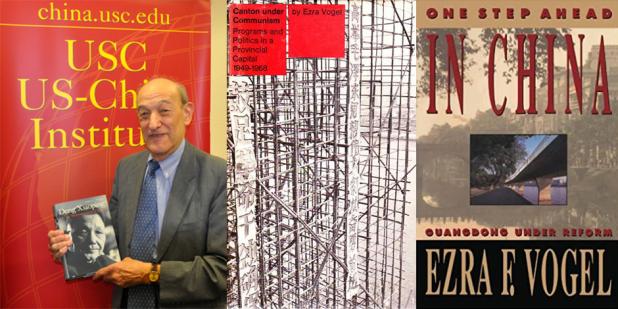Happy Lunar New Year from the USC US-China Institute!
In memoriam: Ezra Vogel 傅高义, 1930-2020

Ezra Vogel 傅高义, a founding member of the USC U.S.-China Institute board of scholars and among the most distinguished scholars of East Asia passed away on December 20, 2020. He was 90 years old. Vogel was a post-doctoral scholar at Harvard University from 1961 to 1964 when he joined the faculty. He formally retired in 2000, but remained active as a researcher and speaker for the next two decades. In 2011, Prof. Vogel visited USC and drew on his monumental study Deng Xiaoping and the Transformation of China for a lecture about Deng's foreign policies were very much driven by his assessment of the desperate need China had for better trained personnel, foreign capital, and foreign technology. It's below and at our YouTube channel.
Vogel was born in 1930 in Ohio and graduated from Ohio Wesleyan in 1950. He earned his doctorate from Harvard in 1958. He taught for a year at Yale before accepting a fellowship for post-doctoral research. While at Harvard, he often served in leadership positions, at various times heading the Fairbank Center for Chinese Studies, the Council on East Asian Studies, the Asia Center and the Program on U.S.-Japan Relations.
A prolific and influential scholar on East Asia, Vogel's China studies books include Canton under Communism; Programs and Politics in a Provincial Capital, 1949-1968 (1969), One Step Ahead in China: Guangdong under Reform (1989), Chinese Society on the Eve of Tiananmen: The Impact of Reform (co-editor, 1990), Living with China: U.S./China Relations in the Twenty-First Century (ed., 1997), China at War: Regions of China, 1937-1945 (co-editor, 2007) and Deng Xiaoping and the Transformation of China (2011). Vogel began publishing on Japan in 1963, with his Japan's New Middle Class; the Salary Man and his Family in a Tokyo Suburb. Other books included Modern Japanese Organization and Decision-making (1975), the best-selling Japan as Number One: Lessons for America (1979) and his follow-up Is Japan Still Number One? (2000).
Vogel had several books addressing East Asia more generally. These include Ideology and National Competitiveness: an Analysis of Nine Countries (1987), The Four Little Dragons: The Spread of Industrialization in East Asia (1993), The Golden Age of the U.S.-China-Japan Triangle, 1972-1989 (co-editor, 2002) and China and Japan: Facing History (2019). Other studies include A Modern Introduction to the Family (co-author, 1960), Comeback, Case by Case : Building the Resurgence of American Business (1985) and The Park Chung Hee Era: The Transformation of South Korea (co-editor, 2011).
Early in the Bill Clinton administration, Prof. Vogel took leave to serve for two years as the National Intelligence Officer for East Asia at the National Intelligence Council in Washington. Vogel received numerous honors and spoke with top officials in China and Japan. Prof. Vogel is survived by his wife, Prof. Charlotte Ikels (anthropology, Case Western Reserve University), three children and five grandchildren.
 |
| Visiting Huntington Gardens in 2011: Ezra Vogel, Charlotte Ikels, grandson Caleb Vogel and Robert Kapp. |
Featured Articles
We note the passing of many prominent individuals who played some role in U.S.-China affairs, whether in politics, economics or in helping people in one place understand the other.
Events
Ying Zhu looks at new developments for Chinese and global streaming services.
David Zweig examines China's talent recruitment efforts, particularly towards those scientists and engineers who left China for further study. U.S. universities, labs and companies have long brought in talent from China. Are such people still welcome?






